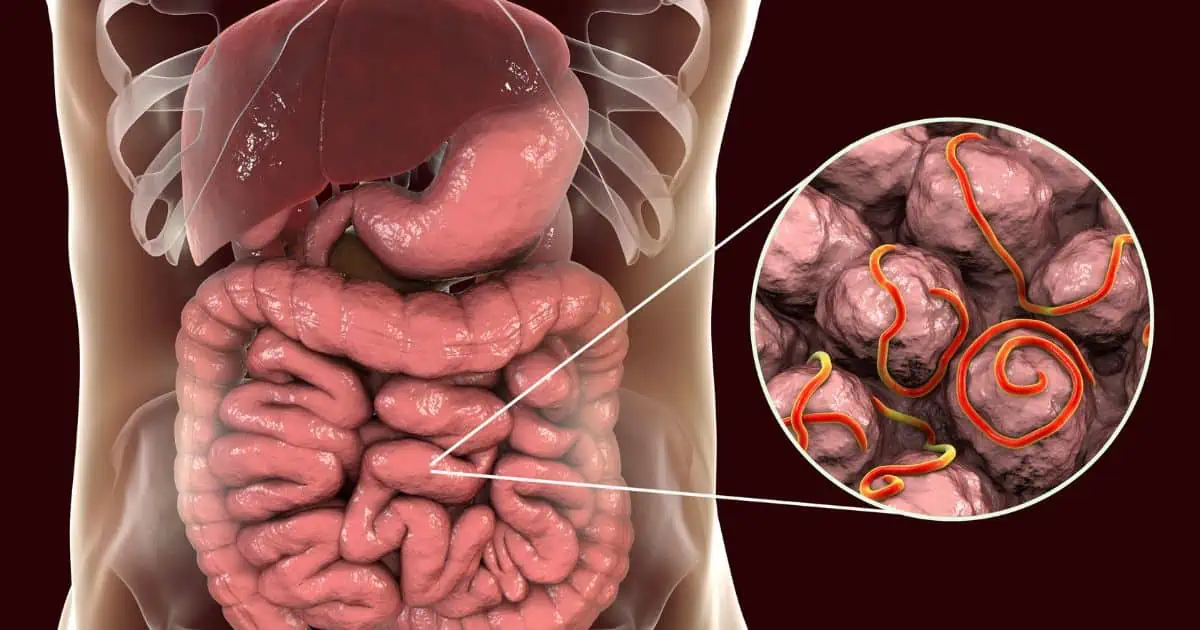As entrepreneurs and heart-centered business owners, we priortize our businesses over physical and emotional health. We push ourselves to the brink of exhaustion, abdominal pain and, in some cases, even burnout. One contributing factor is gut health and its impact on cortisol output and adrenal insufficiency.
This is precisely what happened to me in my early 30’s, which led to my journey into Functional Medicine and recovery from Chronic Fatigue Syndrome.
My story started with extreme stress, IBS symptoms, brain fog, and cortisol dysregulation. I was ultimately diagnosed with chronic fatigue syndrome and fibromyalgia. It severely hampered my quality of life and prevented me from working for almost 2 years.
I was eating a poor diet of highly refined foods with a large amount of sugar that was driving the IBS affects and brain fog, hampering my quality of life. Having lived with adrenal insufficiency and symptoms affecting my digestive tract and being formally trained in Functional Medicine allows me to help you with the underlying cause of your health challenges and how to address them.
I made the dietary changes and lifestyle changes I addressed in this article to reverse my symptoms.
Stress, the ubiquitous companion of modern life, casts a shadow over our well-being in myriad ways. It creeps into every facet of our existence, from the bustling boardroom to the serenity of our homes. What many might not realize is the intricate web of connections that tie psychological distress, gut health, and adrenal fatigue together.
In this exploration, we’ll uncover the surprising links between these seemingly unrelated domains of irritable bowel syndrome(IBS) and adrenal insufficiency and shed light on how their balance or imbalance can profoundly affect your overall health.
So, what’s the connection between Adrenal Fatigue and Irritable Bowel Syndrome or IBS?

Stress isn’t just a mental or emotional phenomenon; it impacts the entire body. The gut, often called the digestive tract, nervous system or “second brain,” is particularly vulnerable to the effects of feeling stressed.
When stress persists, it can disrupt the delicate balance of the gut microbiome, setting off a chain reaction that ultimately leads to adrenal fatigue. Surprisingly, your own gut microbiota and adrenals share a common language, and this connection is crucial for maintaining overall health.
Signs of Adrenal Dysfunction
Adrenal dysfunction is often referred to as adrenal or chronic fatigue syndrome, even though this isn’t a widely accepted medical term. It refers to a condition that can significantly impact your overall health, energy levels, and vitality.
It’s essential to recognize the stages of physical symptoms of adrenal fatigue to address them effectively. Adrenal fatigue is a common condition that occurs when the adrenal glands cannot keep up with the demands of stress hormones.
Symptoms can include fatigue, irritability, weight gain, and even gastrointestinal tract issues such as diarrhea and constipation, which can be termed IBS. In this blog post, we’ll explore how gut health and adrenal fatigue are interconnected and what we can do to support both. Here, we explore the four stages:
Stage 1: Alarm Reaction
In this initial stage, your body goes into an alarm mode in response to stressors, which could be as simple as a job interview. During this phase, your body produces hormones for stress response, including adrenaline, cortisol, DHEA (dehydroepiandrosterone), and norepinephrine, primarily by your hypothalamic pituitary adrenal axis.
Fatigue from stress hormone is mild, and you may turn to coffee, tea, and stimulants to reduce stress.
Stage 2: Resistance Response
As stress continues, cortisol levels rise, and exhaustion becomes more apparent. Cortisol is your main stress hormone. While normal activities can still be carried out, you may take longer to feel fully rested since your immune system and cortisol response are compromised, and your ability to manage symptoms will be compromised.
Dysregulation of stress hormones and systems leads to various physical symptoms, such as lower abdominal pain,, irritable bowel syndrome symptoms, digestive issues, jitteriness, body aches, irritability, depression, irregular sleeping patterns, and elevated blood pressure.
Stage 3: Adrenal Exhaustion
During this stage, the endocrine system becomes focused on producing stress hormones, and cortisol levels will decline. Frequent illnesses, profound fatigue, IBS symptoms, and anxiety set in. Adrenal depletion triggers a catabolic response, where muscular tissue breaks down to provide energy, leading to the effects of an adrenal crash.
You may even be suffering from celiac disease in stage 3 adrenal exhaustion. Your immune system is severely compromised.

Stage 4: Burnout
Stage four represents a rare and severe scenario where your adrenals cease functioning. Hopefully, you don’t get to the stage before you seek help!
Impaired Gastrointestinal Health and Adrenal Fatigue: A Complex Interplay
The interplay between GI symptoms and adrenal fatigue is a two-way street, with each condition feeding into and exacerbating the two other symptoms. [1]
We’ll explore how an unhealthy gut negatively impacts adrenal function and vice versa. From dysregulated cortisol rhythms to systemic inflammation, we’ll unravel the intricate connections that can wreak havoc on your health.
Let’s delve deeper into how this dynamic interaction works:
The Gut-Brain Connection
A network of neurons, hormones, and chemicals connects our gut and brain. [2] This means that what we eat can affect our mood, emotions, and cognitive function. When we experience stress, our gut can also be affected, resulting in digestive issues such as irritable bowel syndrome with common gastrointestinal symptoms like bloating, constipation, and diarrhea.

Chronic Stress and Gut Health
Chronic stress, whether it’s due to work pressures, emotional turmoil, or other factors, can trigger a “fight or flight” response in the body. This stress response, controlled by the adrenals, involves the release of cortisol and other stress hormones.
While this response is essential for short-term survival, chronic stress can lead to the overproduction of cortisol, which can have detrimental effects on the gut and digestive system and produce irritable bowel syndrome or IBS symptoms such as alternating diarrhea, constipation, and permeable gut [3].
Excess cortisol can disrupt the balance of the gut microbiome, leading to dysbiosis, a condition where harmful bacteria outweigh beneficial ones. Stress can impair the gut lining, causing it to become more permeable and allowing harmful bacteria, undigested food particles, and toxins to leak into the bloodstream.
This is known as “leaky gut syndrome” and can contribute to inflammation in the body, which can cause further stress on the nervous system and the adrenals.
Conversely, an imbalanced gut can contribute to stress and exacerbate adrenal fatigue.
Effects on Stress Levels
A compromised gut can impact the production and regulation of neurotransmitters like serotonin and dopamine, which play a crucial role in mood regulation. An unhealthy gut can lead to imbalances in these neurotransmitters, potentially causing symptoms of anxiety and depression, which are often linked to chronic stress.
Inflammation and the Gut-Brain Axis
The gut is closely connected to the brain through the gut-brain axis. Inflammation in the gut, as seen in conditions like leaky gut and inflammatory bowel disease, can trigger inflammatory signals that affect the brain and nervous system and contribute to stress and mood disturbances.
Nutrient Absorption
A compromised gut can also impact nutrient absorption, leading to deficiencies in essential vitamins and minerals. These nutrient deficiencies can further exacerbate adrenal fatigue, lower abdominal pain,, and stress.
Key Nutrients
Nutrients such as B vitamins, magnesium, and vitamin C are vital for adrenal health and the digestive system for production of cortisol response and stress hormones. When the gut cannot absorb these nutrients efficiently, it can hinder the body and immune system’s ability to produce cortisol and manage stress.
Infections
Persistent gut infections, such as those caused by parasites or harmful bacteria, can be a source of chronic inflammation and acute stress for the body and immune system. The immune system’s response to these infections can overwork the adrenal glands, leading to adrenal fatigue.

Hormonal Dysregulation
An imbalanced gut can disrupt the endocrine system, affecting hormone production and regulation. This hormonal dysregulation can contribute to both stress and adrenal fatigue.
The Impact of Diet:
The food we eat can greatly impact our gut health and adrenal function. A diet rich in pre-packaged foods, sugar, and unhealthy fats can contribute to inflammation in the body, affecting the gut lining and adrenal function. On the other hand, a diet rich in whole foods, fruits, vegetables, and healthy fats can support gut health and adrenal function.
It’s important to note that everyone’s body is different, and what works for one person may not work for another.
Live Life Well!
Join our email list for exclusive offers and the latest news
We agree to never spam you, by submitting you agree to our Terms of Services
Reversing IBS and Adrenal Fatigue with Lifestyle and Functional Medicine
Regaining balance and supporting both gut and adrenal health is possible through a combination of practical and holistic strategies. Here, we’ll explore 14 actionable tips, each explained briefly, that can empower you to nurture your well-being, reducing stress, and improve your quality of life:
1. Stress Management Techniques
Incorporate stress-reduction practices into your daily routine, such as mindfulness meditation, deep breathing exercises, and yoga. These techniques help regulate the stress response, support gut health, and promote relaxation.
Incorporate these techniques into your daily routine, even if it’s just a few minutes each day. Start small and gradually increase the duration and frequency over time.
2. Balanced Diet
Adopt a well-balanced diet rich in whole foods, including plenty of fruits, vegetables, lean proteins, and whole grains. Prioritize nutrient-dense foods to support adrenal and gut health. Incorporate foods that will provide minerals, vitamin C, fat-soluble vitamins, and other nutrients to support your gut health and adrenal glands. We promote variations on the Mediterranean diet to our clients since this has been proven best for longevity and overall health. However, each client will need a modified food program according to their unique symptoms. We don’t count calories, and restrictive dieting is NEVER part of our therapeutic plans at Metabolix Health.

3. Hydration
Stay adequately hydrated by drinking plenty of water throughout the day. Proper hydration is essential for optimal bodily functions, including digestion and hormone regulation.
4. Regular Sleep Patterns
Prioritize quality sleep by maintaining regular behavioral patterns and creating a conducive sleep environment. Sleep is essential for adrenal health as it’s the time when our bodies can repair, regenerate, and restore. Chronic lack of rest can contribute to adrenal fatigue, as well as gastrointestinal symptoms such as digestive issues, constipation, and persistent fatigue.
To support both gut health and adrenal function, aim for 7-8 hours of quality rest each night. Aim for a consistent routine SEVEN days per week – yes, do not alter your patterns over the weekends – this can disrupt your circadian rhythm and your adrenal glands when you are working to improve your health. Create a relaxing bedtime routine, limit screen time before bed, and keep your bedroom cool, dark, and quiet.
5. Caffeine Moderation:
Limit or avoid excessive caffeine intake, especially in the afternoon and evening. Caffeine can disrupt sleep and overstimulate the adrenals.

6. Limit Sugar and Processed Foods
Reduce consumption of sugary and processed foods, which can contribute to chronic inflammation and gut imbalances. Focus on whole, unprocessed foods instead.
7. Probiotic-Rich Foods
Incorporate probiotic-rich foods like yogurt, kefir, sauerkraut, and kimchi into your diet to support a healthy gut microbiome supporting any underlying cause such as gi infection, constipation or diarrhea symptoms.
8. Prebiotic Foods
Consume prebiotic-rich foods such as garlic, onions, leeks, and asparagus to nourish beneficial gut bacteria.
9. Supplementation
Consider targeted supplements and herbs supporting gut health and feeling exhausted, including probiotics, digestive enzymes, Vitamin D, ashwagandha, magnesium, holy basil, and licorice root. Like diet, it’s important to work with a healthcare practitioner to determine the best supplements and herbs for your UNIQUE root cause and needs.

10. Mindful Lifestyle Adjustments
Embrace a mindful and balanced lifestyle. Prioritize self-care, engage in hobbies you enjoy, maintain social connections, and set realistic goals to reduce stress.
11. Exercise Wisely
Engage in regular physical activity, but avoid overexertion. Incorporate aerobic exercise and strength training into your routine, but be mindful not to overstrain your body.
12. Avoid Overworking
Balance work and personal life to prevent overexertion and excessive psychological stress. Set boundaries and take breaks when needed.
13. Regular Check-Ins
Consult a healthcare practitioner for regular check-ups and monitoring of your adrenal and irritable bowel syndrome symptoms. Individualized guidance can help identify and address specific issues.
14. Counseling and Therapy:
Consider therapy or counseling to address the underlying root cause of emotional stress and trauma that may contribute to adrenal fatigue.
Conclusion to healing Adrenal fatigue and IBS Symptoms
The bidirectional relationship between Irritable Bowel Syndrome (IBS) and adrenal fatigue is a complex interplay that involves multiple pathways, including the gut-brain axis, neurotransmitter regulation, and nutrient absorption.
As one condition worsens, it can perpetuate a cycle of fatigue and IBS and further compromise other symptoms. Recognizing and addressing both gut health and adrenal health is essential for achieving overall well-being and balance in the body’s stress response.
A holistic approach that considers the gut-adrenal connection is often necessary to break the fatigue and IBS cycle and promote recovery. By incorporating healthy habits like a whole foods diet, quality sleep, stress management techniques, and supplements/herbs, we can stay healthy, happy, and energized as we continue to grow our businesses.
As entrepreneurs and heart-centered business owners, it’s important to prioritize our own health and well-being. Understanding the connection between gut health and adrenal fatigue can help us to make informed choices that support both.
If you are interested in getting tested for Adrenal Fatigue and IBS symptoms taking your unique situation into account, please head to our Focused approach to Gut Health to learn more how we work with our clients online.
Resources
- Zhang H, Wang Z, Wang G, Song X, Qian Y, Liao Z, Sui L, Ai L, Xia Y. Understanding the Connection between Gut Homeostasis and Psychological Stress. J Nutr. 2023 Apr;153(4):924-939. doi: 10.1016/j.tjnut.2023.01.026. Epub 2023 Jan 31. PMID: 36806451.
- Appleton J. The Gut-Brain Axis: Influence of Microbiota on Mood and Mental Health. Integr Med (Encinitas). 2018 Aug;17(4):28-32. PMID: 31043907; PMCID: PMC6469458.
- Quénéhervé, Lucille & Drui, Delphine & Blin, Justine & Péré, M. & Coron, E. & Barbara, Giovanni & Barbaro, M. & Cariou, Bertrand & Neunlist, Michel & Masson, Damien & Bach-Ngohou, K.. (2021). Digestive symptoms in daily life of chronic adrenal insufficiency patients are similar to irritable bowel syndrome symptoms. Scientific Reports. 11. 8077. 10.1038/s41598-021-87158-2.
This website and its contents have not been evaluated by the Food & Drug Administration. The information shared and outlined in this article is not a substitute for medical advice from your doctor. Please consult your doctor before acting on anything in this article or any other content on our website, particularly if you are pregnant, nursing, taking medications or have a diagnosed medical condition. Information shared is for informational purposes only.
Our content may include products specifically chosen and validated by Clare Kelway. If you purchase anything from us referenced in this article, please note that we may earn a commission, however small.